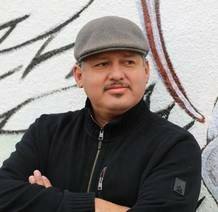
HURON, Calif. – Beyond the boarded-up buildings and patchwork fences that others view as eyesores, Huron Mayor Rey Leon sees potential in this tiny central California farm town that has been mired in poverty for decades.
On a dirty restaurant wall, Leon envisions a mural depicting Bracero farmworkers, like his father who came from Mexico. In a dirt lot next to a soccer field, he imagines a rose garden. On fallowed land covered with weeds outside town, he pictures a park.
Leon, 45, was a reluctant and unlikely leader for one of the state’s poorest cities. Huron is home to a large Latino population where mostly seasonal work leaves 2 in 5 residents in poverty and only about a quarter of adults have high school degrees.
He graduated from the local high school, earned a degree at the University of California, Berkeley, and spent the bulk of his career as a clean air advocate and champion of environmental justice in nearby Fresno before returning a couple of years ago.
“I came back home not because we have the good coffee shop, not because we have the nice plaza to hang out at or the trails to walk around, but because my community deserves that, and I want to make it exist,” Leon said.
He credits his success partly to his mother for spending more time with him as the youngest of seven children and to two years in better elementary schools in Napa, north of San Francisco. Leon was the only Mexican student there, living with an aunt and uncle as his parents struggled in their marriage.
He returned home and discovered later he was a “Chicano nerd” with a curiosity for learning rather than following in the path of his older brothers. Several of them ended up behind bars.
Several years ago, while working with his tiny non-profit, The LEAP Institute – short for Latino Environmental Advancement & Policy Project – to identify transportation projects to improve Huron, Leon was approached about running for mayor. He declined.
But when he moved back in 2016 to be closer to his aging parents, he realized that the projects he was advocating for – building bike lanes and creating a plaza as an outdoor meeting place – could be what he would work on as a city leader.
He was elected in 2016 to a two-year term and is unopposed for re-election next month. He is paid $250 per month for the position that requires attending two City Council meetings a month.
Leon’s father died in the past year, and Leon now lives in the small house tucked behind the bar and restaurant that his father operated for decades.
His main source of income comes from running his non-profit, which has a program that shuttles retired farmworkers to doctor’s appointments in electric vehicles.
Leon wants to make Huron the greenest farmworker town, where people walk and ride bikes to get around and newly planted trees capture carbon emissions, but he has realistic goals.
During a tour last month, he pointed to saplings he planted in front of houses desperate for shade, new LED lights that cut city electric bills and a soccer program to keep kids from joining two gangs.
Leon, like mayors in Arvin and Stockton, represents a trend of homegrown activists becoming leaders in the San Joaquin Valley, where agriculture and oil industries have long influenced politics, said Caroline Farrell, executive director of the Center on Race, Poverty & the Environment, a group that provides legal assistance to poor communities and people of colour.
“It’s completely new to have somebody who has this kind of a vision,” Farrell said. “Rey is really thinking about the just transition that needs to happen in the valley if we’re going to be dealing with climate change and if we’re going to be dealing with water issues and extreme heat and all of this.”
–––
This report is part of a series on how California’s struggles with soaring housing costs, job displacement and a divide over liberal policies are affecting the November election. See full coverage at: https://apnews.com/CaliforniaataCrossroads